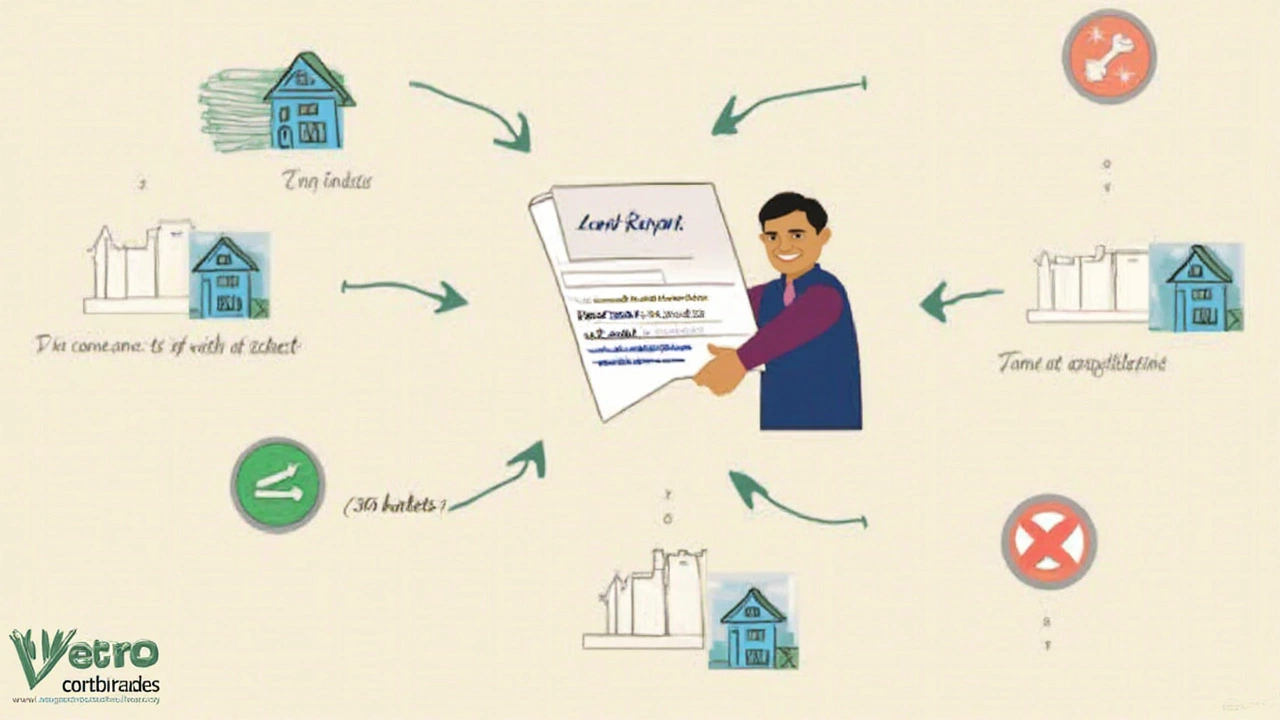Credit Score Needed for an Apartment: What Landlords Really Look For

Jun, 8 2025
Ever stressed about your credit score when hunting for an apartment? You’re not alone. Landlords don’t just care about your rent payment—they want to see that you’re reliable with money. Most landlords look for a credit score of at least 620, but the sweet spot is usually above 650 if you want your pick of places. Think of it as a quick snapshot that tells them if you’re likely to pay on time each month.
The numbers can get confusing, especially because different landlords and management companies have their own rules. Some luxury buildings may want to see a score over 700, while smaller places or private landlords—think downstairs from your friend’s aunt—might be cool with someone closer to 600 if the rest of your application looks good. It’s not always black and white, but knowing the typical range helps you set your expectations.
- What Credit Score Is Needed?
- Why Credit Scores Matter to Landlords
- What If My Score Is Low?
- Other Things Landlords Check
- Pro Tips to Strengthen Your Application
What Credit Score Is Needed?
If you’re wondering about the magic number, here’s the deal: most landlords want to see a credit score of at least 620. This isn’t just some random line in the sand—it’s the level where you look like a safe bet to pay rent on time and not flake out. But things aren’t that strict everywhere.
If you’re in a bigger city with competition for rentals, property managers may want to see 680 or higher, while luxury apartments sometimes ask for 700 and up. On the flip side, smaller landlords might accept applicants with scores as low as 580, especially if you can show steady income or offer a larger deposit. Private owners can be a bit more flexible, but bigger companies have rigid rules on numbers.
Here’s a quick breakdown of what’s usually expected:
- 580–619: Tricky but not impossible. You might need a cosigner or pay more up front.
- 620–679: This range can get you approved for most rentals, though the best deals may stay just out of reach.
- 680–739: Landlords generally see you as a strong applicant with lots of options.
- 740+: You’re golden—you’ll likely have your pick of places and can negotiate more easily.
Keep in mind, credit score isn’t the only thing that matters, but it’s the fastest way landlords filter out who gets a second look. If you don’t fall in the top range, there are still workarounds, which I’ll get into later. For now, knowing where you stand means you can target the right apartments and avoid wasting time. And if you’re not sure what your score is, get it checked before you start your search. Most credit card companies show your score for free these days, so there’s no excuse to go in blind.
Why Credit Scores Matter to Landlords
So why do landlords always peek at your credit score when you’re trying to rent? It’s not just about being nosy. Your credit score helps them figure out if you’re likely to pay rent on time, and if you’ve had issues paying bills in the past. Late payments, maxed-out cards, or collections can make landlords a bit nervous, since they rely on steady rent to keep their property going.
Think of it as a strong filter. With rental scams and missed payments on the rise, landlords need a quick way to sort through piles of applications. A solid credit score means fewer worries for them—and it can mean less hassle for you. About 90% of larger property managers use at least a soft credit check before approving a new tenant, while smaller independent landlords might just check references, but even that’s changing fast.
Here’s what’s often on a landlord’s radar when checking your credit:
- Payment history: Ever missed a credit card or car payment? That pops up fast.
- Current debts: If your cards are all maxed, that can be a red flag.
- Big issues: Things like bankruptcy or past evictions usually wave a big stop sign.
A 2023 survey from the National Multifamily Housing Council broke down what types of checks property managers run before approval:
| Screening Type | % of Landlords Using |
|---|---|
| Credit Checks | 94% |
| Criminal Background | 91% |
| Employment Verification | 75% |
| Rental History | 69% |
The higher your credit score, the more “low-maintenance” you look as a tenant. To a landlord, a good renter doesn’t leave suddenly, doesn’t miss payments, and doesn’t bring financial drama. That’s why your credit history gets put under the microscope before you sign that lease.

What If My Score Is Low?
If your credit score isn’t hitting that magic number, don’t panic. Landlords say no to applicants with low credit, but it’s not always a dealbreaker. According to TransUnion, about 44% of renters have a credit score below 650, so you’re definitely not the only one in this boat.
"Most property managers aren’t looking for perfect credit; they’re really looking for a pattern that shows you pay your bills on time." — Angela Colley, Apartment Guide rental expert
Some landlords look beyond just the score. Maybe you missed a few payments years ago, but your recent track record looks solid. That can help your case.
Here are a few tricks if your score isn’t great:
- Offer a bigger security deposit. Some landlords are open to it if your score is shaky.
- Find a co-signer. If you have someone with a better credit score who trusts you (like a parent or close friend), this works almost like backup for the landlord.
- Show proof of steady income or savings. Bank statements or job letters can go a long way, showing you can cover rent even if your score is low.
- Write a short letter explaining your situation. If you had a medical bill or job loss, mention it up front. Some landlords appreciate the honesty and context.
The chart below shows how often landlords approve applicants with different credit score ranges, based on a 2024 survey from RentCafe:
| Credit Score Range | Approx. Approval Rate |
|---|---|
| 740+ | 90% |
| 650 - 739 | 75% |
| 600 - 649 | 52% |
| Below 600 | 20% |
So even if your score isn’t great, you’ve still got options. Not every landlord expects perfect credit—sometimes showing you’re responsible today matters more than old mistakes.
Other Things Landlords Check
It’s not just about your credit score when you apply for an apartment. Landlords want the whole picture, so they dig deeper before handing over those keys.
Their checklist usually includes:
- Proof of income: Most want to see pay stubs or bank statements. They’re usually looking for renters who make at least 2.5 to 3 times the monthly rent.
- Rental history: Expect a call or email to your current or previous landlord. If you have a history of late payments or evictions, it might raise a red flag.
- Background checks: Lots of landlords run basic criminal background checks. Not everyone has the same standards, but violent offenses or recent felonies are a big problem for most.
- Employment verification: They might contact your employer just to confirm you actually work where you say you work.
- References: Personal or professional references can help, especially if you’re short on rental history.
Don’t forget, different landlords care about different things. Some will look past a rough patch if your job is steady or you’ve got decent references. Others are sticklers for the numbers.
Here’s a quick look at what most landlords check, based on a survey of 2,000 property managers in 2024:
| Screening Factor | % of Landlords Checking |
|---|---|
| Credit report/score | 91% |
| Proof of income | 85% |
| Rental history | 78% |
| Background check | 74% |
| References | 60% |
If you know a weak spot in your application, try offering a co-signer or a bigger deposit. Being honest up front and showing you’re reliable goes a long way.

Pro Tips to Strengthen Your Application
If your credit score isn’t perfect, don’t panic—there’s a lot you can do to make your rental application stand out. Landlords look at way more than just a number. Show them you can be trusted, and your odds go way up, even if your score doesn’t hit that magic 650.
- Show proof of steady income. Most landlords want to see your monthly income is at least three times the rent. Bring recent pay stubs, a letter from your employer, or bank statements to prove you’ve got enough coming in each month.
- Offer a larger security deposit. If your score is shaky, throwing down an extra month’s rent or a bigger deposit can calm a landlord’s nerves. Some places legally cap the deposit, but in many cities, this can tip things in your favor.
- Get solid references. Letters from a former landlord or work supervisor go a long way. A quick note vouching for your responsibility sometimes carries more weight than numbers alone.
- Bring a co-signer. If you’ve got a parent, sibling, or close friend with a solid credit score who’s willing to co-sign, you’ll look less risky. Many landlords accept this, especially with younger renters or students.
- Write a quick personal letter. It sounds old-school, but introducing yourself, explaining any one-time credit dings, and showing you’re responsible—even with details like how long you plan to stay—can move your application to the “yes” pile.
If you want to boost your chances quick, check your credit for mistakes. According to an FTC study, about 20% of people spot errors when they pull their report from one of the big three bureaus (Experian, Equifax, TransUnion). Dispute any errors before you apply—you might get a quick bump in your score.
Here’s a look at how different parts of your application can help balance out a lower credit score:
| Application Factor | How Much It Helps | Typical Proof Needed |
|---|---|---|
| Income | High impact | Pay stubs, bank statements |
| Security Deposit | Medium to high impact | Funds ready up front |
| References | Medium impact | Written letters or contact info |
| Co-signer | High impact | Signed agreement by co-signer |
| Personal letter | Low to medium impact | Written explanation |
If you’re unsure, ask the landlord what they value most. Some care more about your current job or cash flow than whether your score is 625 or 700. Every place is different, but being prepared always helps. You don’t need a perfect credit score; you just need a strong application that covers all the bases.